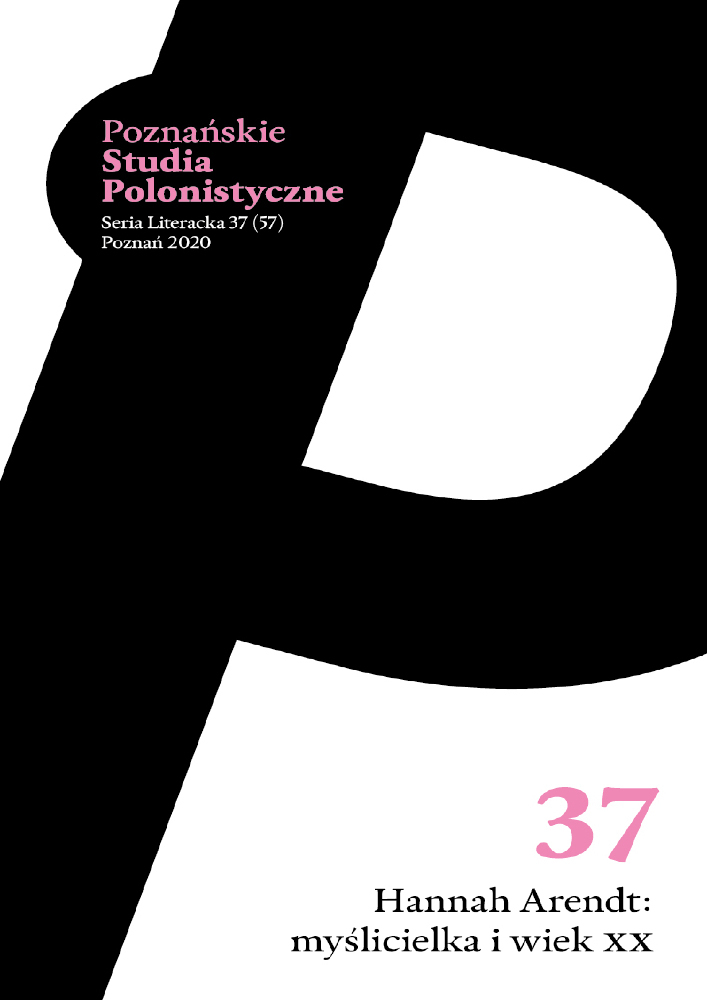Abstract
The three authors’ community of thought can be noticed in the analysis of their attitude towards the Nietzschean concept of ressentiment. Arendt observed the ressentiment and contempt of educated people towards society that grew since the mid-eighteenth century. In Conrad’s prose, a specific culmination of such emotions can be found in the character of the Professor in The Secret Agent novel. Scruton understood a totalitarian state as an institutionalised form of executing ressentiment. Another crucial common point of reference for the three authors was the issue of authority.Scruton reminded us that society exists thanks to authority. The opposite of ressentiment seems to be affirmation, while revolutionary aims of radical
revaluation can be contrasted with conservatism as a philosophy of attachment to what is valuable. One can understand Conrad’s concept of loyalty as such.
References
Arendt Hannah (1991), O rewolucji, przeł. Mieczysław Godyń, Totus, Kraków.
Arendt Hannah (2014), Korzenie totalitaryzmu, przeł. Daniel Grinberg i Mariola Szawiel, Świat Książki, Warszawa.
Conrad Joseph (1973), Tajny agent. Opowieść prosta, przeł. Agnieszka Glinczanka, PIW, Warszawa.
Conrad Joseph (1974), Korsarz, przeł. Ewa Krasnowolska, PIW, Warszawa.
Conrad Joseph (2011), Jądro ciemności, przeł. Magda Heydel, Znak, Kraków.
Conrad Joseph (2017), Serce ciemności. Hearth of Darkness, spolszczenie Jacek Dukaj, Wydawnictwo Literackie, Kraków.
Drożdż Jacek (2000), Resentyment w ujęciu Friedricha Nietzschego i Maxa Schelera, „Pisma Humanistyczne”, t. 2, s. 157-180.
Kuniński Miłowit (2006), Totalitaryzm w ujęciu Hannah Arendt, w: Totalitaryzm a zachodnia tradycja, red. Miłowit Kuniński, Ośrodek Myśli Politycznej, Księgarnia Akademicka, Kraków.
Michalski Rafał (2016), Konserwatywna krytyka humanitaryzmu. Część druga. Max Scheler, Hannah Arendt, „Ruch Filozoficzny”, nr 2, s. 29-52.
Najder Zdzisław (2000), Sztuka i wierność. Szkice o twórczości Josepha Conrada, Wydawnictwo Uniwersytetu Opolskiego, Opole.
Scheler Max (2008), Resentyment a moralność, przeł. Bogdan Baran, Fundacja Aletheia, Warszawa.
Scruton Roger (2002), Co znaczy konserwatyzm, przeł. Tomasz Bieroń, Zysk i S-ka, Poznań.
Scruton Roger (2006), Źródło totalitaryzmu, przeł. Tomasz Kuniński, w: Totalitaryzm a zachodnia tradycja, red. Miłowit Kuniński, Ośrodek Myśli Politycznej, Księgarnia Akademicka, Kraków.
Scruton Roger (2016), Jak być konserwatystą, przeł. Tomasz Bieroń, Zysk i S-ka, Poznań.
Tischner Józef (1999), Siostra Faustyna i Fryderyk Nietzsche, „Tygodnik Powszechny”, nr 2, s. 8 [przedruk w: Józef Tischner (2015), Drogi i bezdroża miłosierdzia, Znak, Kraków].
License
Authors
Authors of texts accepted for publication in „Poznańskie Studia Polonistyczne. Seria Literacka” are required to complete, sign and return to the editor's office the Agreement for granting a royalty-free license to works with a commitment to grant a CC sub-license.
Under the agreement, the authors of texts published in „Poznańskie Studia Polonistyczne. Seria Literacka” grant the Adam Mickiewicz University in Poznań a non-exclusive, royalty-free license and authorize the use of Attribution-NoDerivatives 4.0 International (CC BY-ND 4.0)Creative Commons sub-license.
The authors retain the right to continue the free disposal of the work.
Users
Interested Internet users are entitled to use works published in „Poznańskie Studia Polonistyczne. Seria Literacka” since 2016, for non-commercial purposes only, under the following conditions:
- attribution - obligation to provide, together with the distributed work, information about the authorship, title, source (link to the original work, DOI) and the license itself.
- no derivatives - the work must be preserved in its original form, without the author's consent it is not possible to distribute the modified work, such as translations, publications, etc.
Copyrights are reserved for all texts published before 2016.
Miscellaneous
Adam Mickiewicz University in Poznań retains the right to magazines as a whole (layout, graphic form, title, cover design, logo etc.).
